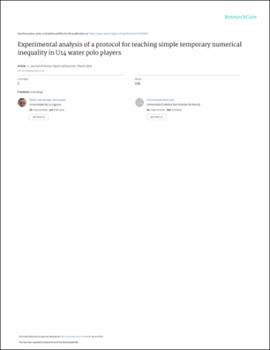Experimental analysis of a protocol for teaching simple temporary numerical inequality in U14 water polo players
Fecha
2018Resumen
This study tries to validate a teaching protocol of playing micro-situations in simple temporary numerical inequality in water polo. 20 theoretical and practical sessions were designed and applied on the appropriate actions to be taken. Observational methodology was used through a descriptive and correlational longitudinal design. The differences between an experimental group and a control group were analyzed in 160 playing micro-situations in relation to goal achievement, failure, interception and duration. There were significant differences between groups (χ²(2)=16.99, p<.001; TE=.23), finding more goals and fewer interceptions in the experimental group. Likewise, there is no statistical significance when analyzing the influence exerted by the start field position in the experimental group, which if observed in control group, who receives more goals from the left wing and more interceptions from the left flat. Finally, there are more failures in control group considering the 3:3 game system. It is concluded that the protocol used with the experimental group is valid, reliable and it is recommended its application in teaching process to facilitate understanding the game dynamics.






